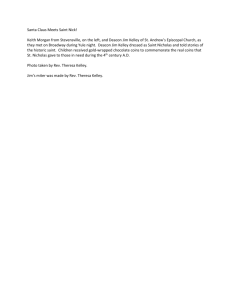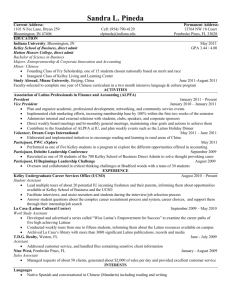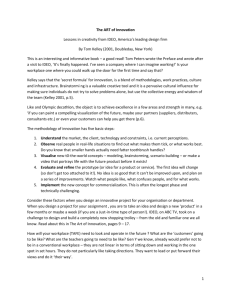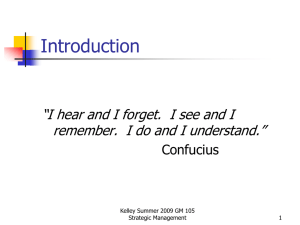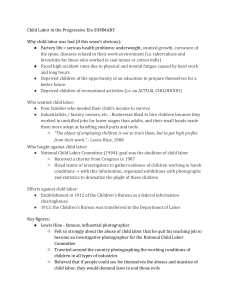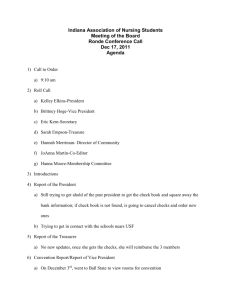I hear and I forget. I see and I remember. I do and I understand.
advertisement
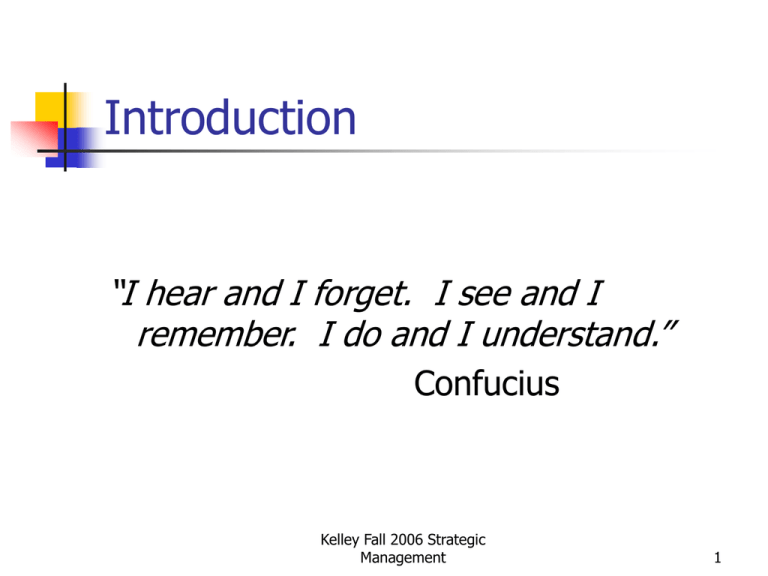
Introduction “I hear and I forget. I see and I remember. I do and I understand.” Confucius Kelley Fall 2006 Strategic Management 1 Decisions Your team makes decisions given competitor past, current and future decisions Your team is responsible for its decisions and performance measures Decisions should be an adventure, not a chore Kelley Fall 2006 Strategic Management 2 Team Operation Each team should select a general manager, and operations, finance and market/product managers. Writing a job description for each manager will clarify the responsibilities of each team member Kelley Fall 2006 Strategic Management 3 Team Operation Work out an arrangement to get each round’s decisions to the general manager. You may choose to meet in person initially then use email as the game progresses and meet as needed. Specify how each member of the team will be evaluated. Kelley Fall 2006 Strategic Management 4 Team Operation Keep a record of all discussions, decisions made and results (Companies keep minutes of meetings). This record will come in handy when the team prepares its annual report in a few weeks and gives its presentation at the end of the course. A hardcover lab notebook works great for this purpose. Kelley Fall 2006 Strategic Management 5 Team Operation You may use any company’s format that you want to write your annual report. An outline of what to include in your team’s presentation at the end of the semester will be handed out later. Kelley Fall 2006 Strategic Management 6 Team Operation Advice – Don’t let problems fester. Problems with team members need to be confronted quickly, honestly and forcefully. Ask the instructor if you have questions about decisions or output. You may want to make an appointment since trying to answer detailed questions in class isn’t the best forum for this purpose. Kelley Fall 2006 Strategic Management 7 Capstone Game The product is a sensor. 6 teams in each industry (3 students per team). Teams only compete with other firms in their industry. Start by marketing 5 brands each targeted toward a different market. May market 3 new brands. Kelley Fall 2006 Strategic Management 8 Captsone Game Firms control positioning of products. Over time consumers want smaller, less expensive sensors. Market size and growth rates are different. Round decisions must be uploaded to the Capsim website by 11:00 a.m. (morning class) or 4:00 p.m. (afternoon class) Kelley Fall 2006 Strategic Management 9 Marketing Decisions Consumer awareness is important. Promotion expenses increase awareness. Sales expenses maintain awareness. Advanced marketing decisions begin in round 3. Kelley Fall 2006 Strategic Management 10 Production Decisions You want to produce at 100% capacity when possible. You may sell excess capacity or add capacity. Generally it is better to utilize over 100% capacity (overtime) rather than sell capacity. Watch inventory stock in each market. Kelley Fall 2006 Strategic Management 11 HR Decisions Hourly wage rate starts in Round 3. A strike is scheduled for Round 6. Kelley Fall 2006 Strategic Management 12 R&D Decisions Total Quality Management begins in Round 3. R&D revision times take longer if you put more than one product is being revised. You want repositioning projects to finish in less than one year. It takes 1 to 3 years to launch a new product. Kelley Fall 2006 Strategic Management 13 Finance Decisions You may issue more stock or bonds to raise capital. You may choose to pay dividends. You may pay off existing debt. Watch your cash flow. Use the pro forma spreadsheet to analyze alternative decisions before uploading decisions. Kelley Fall 2006 Strategic Management 14
